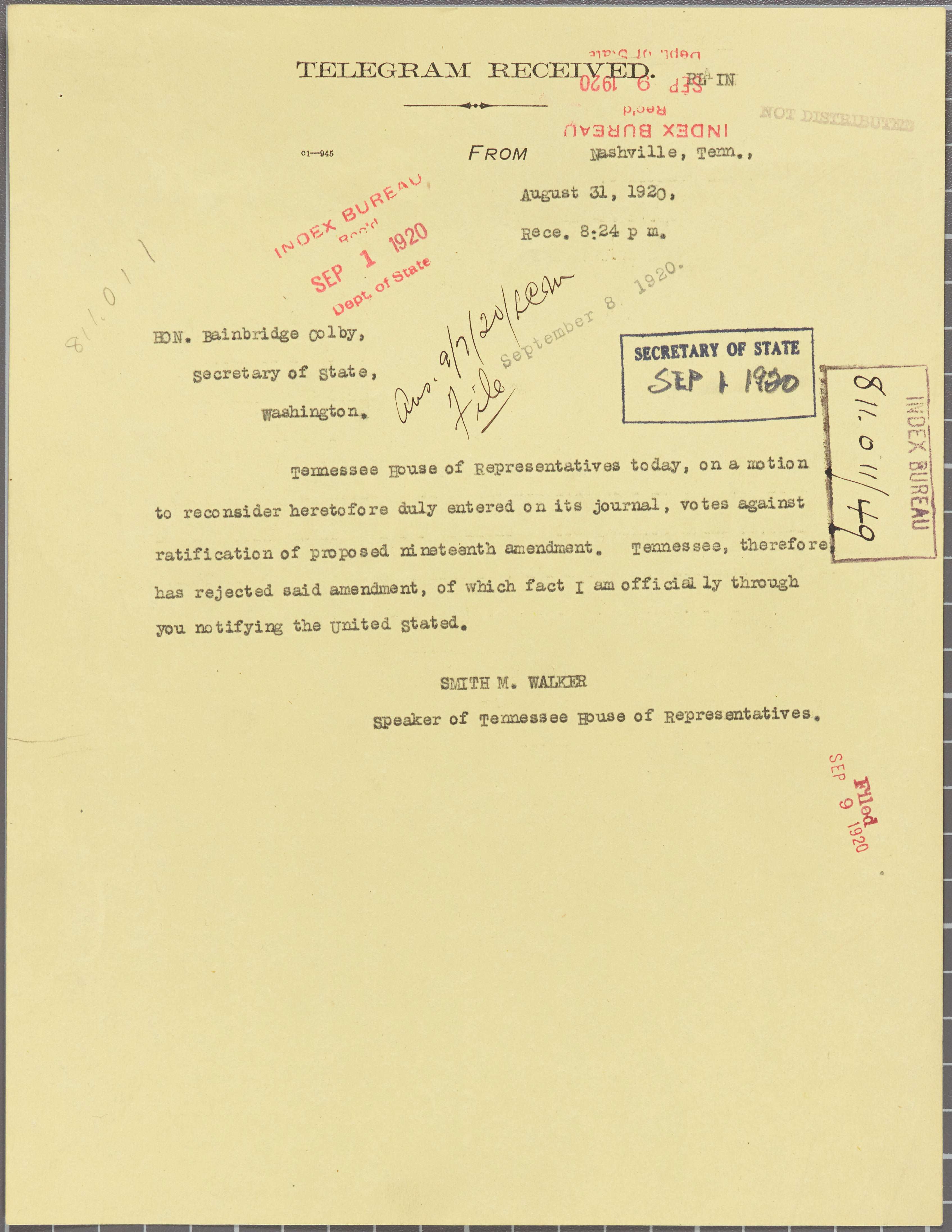Telegram from Seth Walker to the Secretary of State Rejecting the 19th Amendment
8/31/1920
Add to Favorites:
Add all page(s) of this document to activity:

Seth Walker, Speaker of the Tennessee House of Representatives, sent this telegram to Secretary of State Bainbridge Colby notifying him of their vote rejecting 19th Amendment.
After Congress passed a women's suffrage amendment, three-fourths of states (36 at that time) had to ratify the 19th Amendment before it could be added to the Constitution. Many states quickly approved the 19th amendment. By the end of March 1920, only one additional state was needed for ratification.
The ratification had barely passed in Tennessee's House the previous week, on August 18th, when this telegram was sent. Seth Walker was one of several anti-suffragists who tried to rescind the ratification vote. He introduced, and the House adopted, a motion to reconsider its previous approval of the ratification resolution. Then the House voted against ratification, as explained in this document.
This effort failed, however. Tennessee Governor Albert H. Roberts had certified Tennessee’s ratification of the 19th Amendment, based on the original vote to ratify, on August 24th; Secretary of State Bainbridge Colby signed the certificate of ratification on August 26, 1920. Tennessee became the 36th state to ratify, clinching the passage of the amendment allowing women the right to vote.
After Congress passed a women's suffrage amendment, three-fourths of states (36 at that time) had to ratify the 19th Amendment before it could be added to the Constitution. Many states quickly approved the 19th amendment. By the end of March 1920, only one additional state was needed for ratification.
The ratification had barely passed in Tennessee's House the previous week, on August 18th, when this telegram was sent. Seth Walker was one of several anti-suffragists who tried to rescind the ratification vote. He introduced, and the House adopted, a motion to reconsider its previous approval of the ratification resolution. Then the House voted against ratification, as explained in this document.
This effort failed, however. Tennessee Governor Albert H. Roberts had certified Tennessee’s ratification of the 19th Amendment, based on the original vote to ratify, on August 24th; Secretary of State Bainbridge Colby signed the certificate of ratification on August 26, 1920. Tennessee became the 36th state to ratify, clinching the passage of the amendment allowing women the right to vote.
This primary source comes from the General Records of the United States Government.
National Archives Identifier: 120548503
Full Citation: Typed Copy of Telegram Received by Bainbridge Colby, Secretary of State from Seth M. Walker, Speaker of the Tennessee House of Representatives Notifying Him of Their Vote Rejecting the 19th Amendment; 8/31/1920; Amendment XIX: Women's Right to Vote, 1920 - State: Tennessee; Ratified Amendments, 1795 - 1992; General Records of the United States Government, Record Group 11; National Archives Building, Washington, DC. [Online Version, https://www.docsteach.org/documents/document/walker-rejecting-19th-amendment, April 25, 2024]Rights: Public Domain, Free of Known Copyright Restrictions. Learn more on our privacy and legal page.



